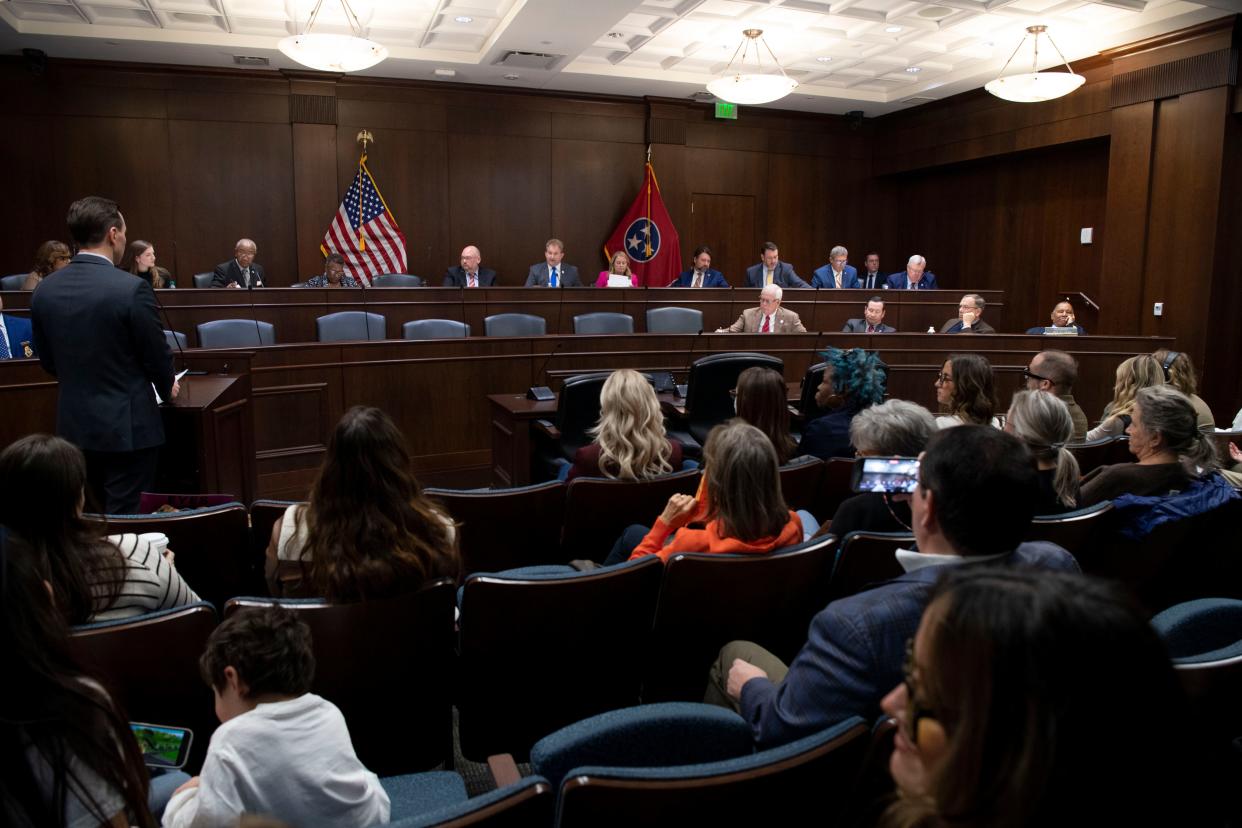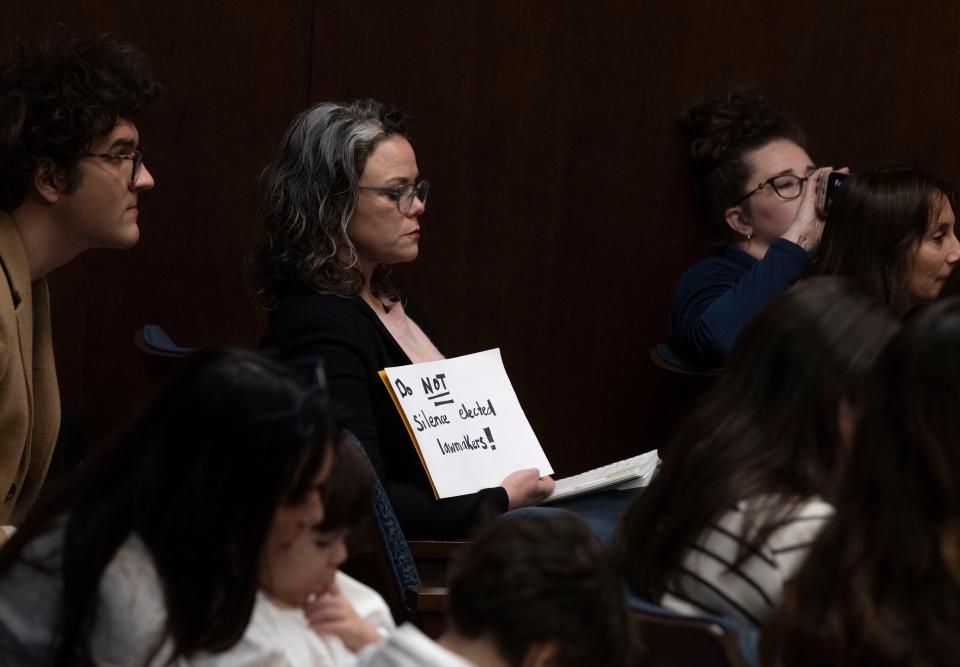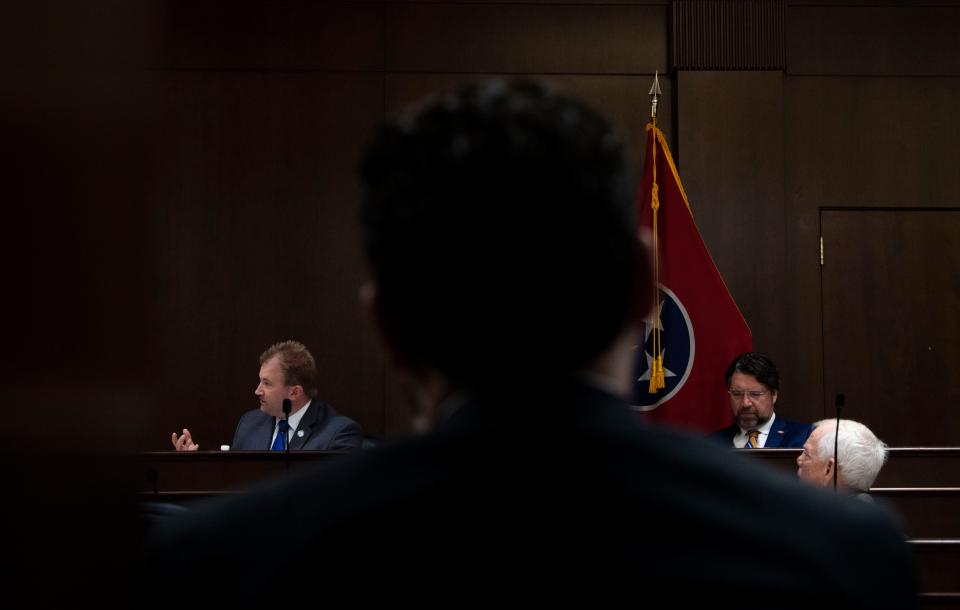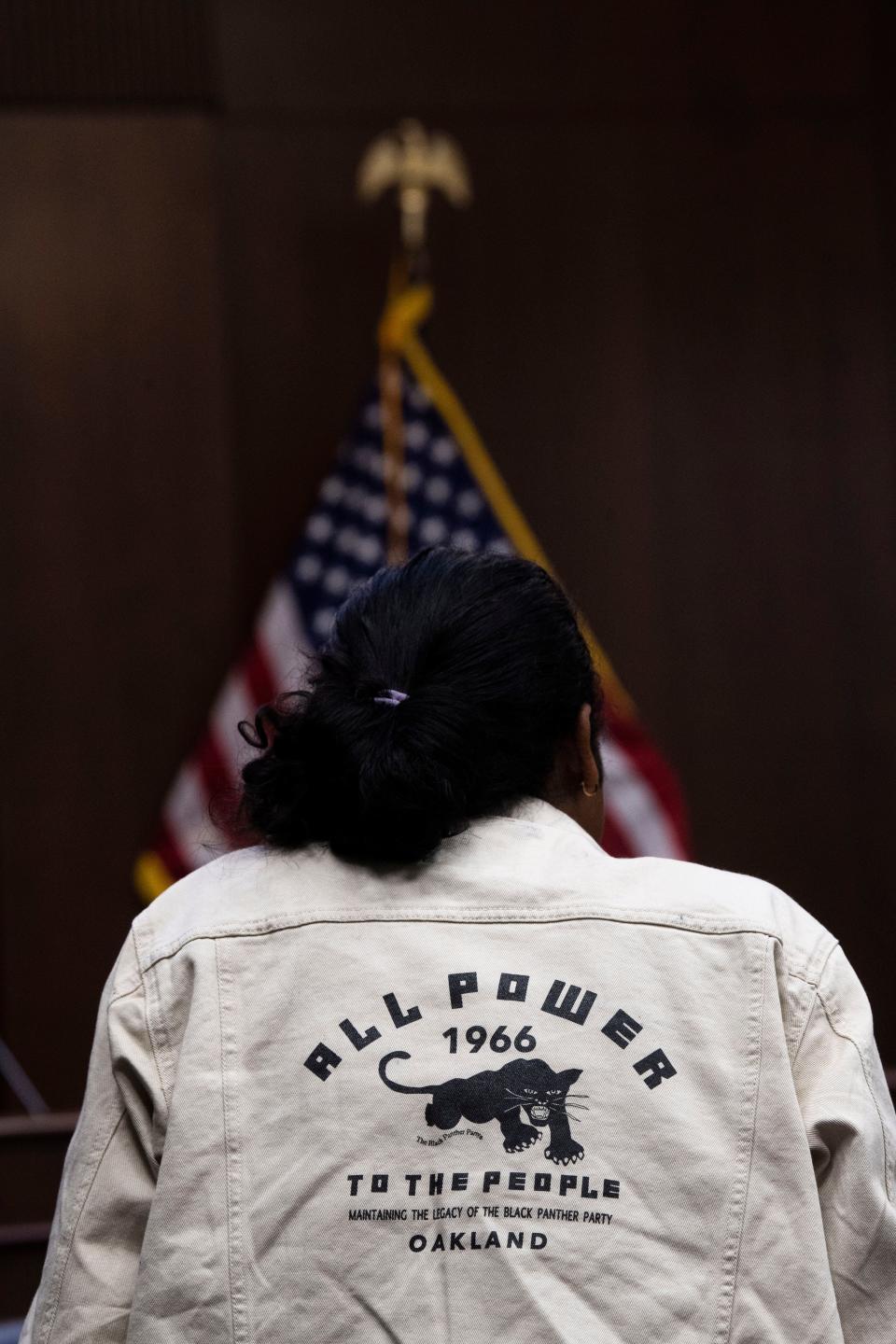TN House rules panel allows members to carry guns — not visual aids — in committee rooms

Tennessee House members can continue to bring guns into committee rooms, and spectators watching legislative proceedings can still hold 8.5 inch-by-11 inch signs this year, but state lawmakers may not use papers or visual aids while they discuss bills — and time limits for debate will be even tighter.
Those are just a few of the new rules for the state House of Representatives given initial approval by the House Rules Committee on Monday in an opening salvo to this year's legislative session.
Rules changes must be adopted by the full House before any changes go into effect. Changes are unlikely once the rules package gets to the floor, though Rep. Justin Jones, D-Nashville, said he would still like to see some modifications — like banning guns in committee rooms. The full House declined to take up new rules on Tuesday, postponing final approval to later this week. Whatever the final product, the House rules will set parameters for order and debate as officials consider changes to state law.
Old rules adopted during the special legislative session last year – such as banning signs in House galleries – do not carry over to this upcoming session. In August, the Republican supermajority adopted stringent rules to try to avoid breaches of decorum that could lead to more expulsion proceedings.
“That’s why I think the rules were tweaked today, is to try to avoid the outbursts,” Rep. Johnny Shaw, D-Memphis, told reporters after the hearing.

A small House committee room was standing room only on Monday morning, with spectators holding signs as members debated the proposed rules. Shaundelle Brooks, a possible House District 60 contender and mother of Waffle House shooting victim Akilah Dasilva, attended the hearing, as did Mary Joyce, mother of a Covenant School shooting survivor.
Committee members ultimately voted down every change proposed by Republicans or Democrats, except for an extensive GOP caucus rules package presented by Republican Caucus Whip Johnny Garrett, R-Goodlettsville.
Here's more about the proposed new House rules, which do not apply to the Senate.
Papers and visual aids banned
This year, House members will not be permitted to bring papers, props or signs inside the House chamber or committee rooms at any time, according to a rule proposed by Garrett. Members will still be allowed to carry paper copies of their bills or working papers, according to Republican Caucus spokesperson Jennifer Easton.
“No member at any time can enter any committee of the House with any visual aids or papers – currently that’s just while we’re in session, now it means any time,” Garrett said. “No member can enter the House with any type of paper or aid while they’re a member of the General Assembly.”

Members of the public will continue to be allowed to carry paper-sized signs. House Majority Leader William Lamberth, R-Portland, clarified that the sign ban adopted during the special session does not extend to current proceedings.
“There is no prohibition of signs,” he said. “There are signs in this room right now. Everyone’s been respectful … Remember, you can’t bring a large sign in, like a billboard or something.”
Guns still allowed in committee rooms
Rules committee members overwhelmingly voted down a proposal by Jones to prohibit the carrying of firearms inside committee rooms at the Cordell Hull State Legislative Office Building.
While guns are prohibited inside the state Capitol, firearms are allowed inside the office building where committee rooms are located. Tennessee law no longer requires legal gun owners to have a permit to carry handguns. Last year, between 25 and 30 guns were allowed into the Cordell Hull building during the first two days of session, according to Rep. Caleb Hemmer, D-Nashville.

“The firearms policy, that's an issue of safety,” Jones told The Tennessean after the hearing. “During special session, we saw members of the Proud Boys here in the legislature. If we’re sitting in a committee room and people are sitting in front of you with guns, that doesn't make anyone feel safe.”
During committee discussion Monday, Shaw asked what the penalty is for carrying a firearm on the House floor, saying that he had “definitely seen members with them,” in the chamber.
Ultimately, Shaw voted against Jones' gun ban proposal.
“I don’t particularly think we should take guns to the floor, but if members are going to take guns, I think I should be able to take my gun,” Shaw said.
Franklin Rep. Sam Whitson, R-Franklin, was the lone Republican who joined Minority Leader Karen Camper, D-Memphis, to vote to ban firearms from committee chambers.
Decorum rules expanded for the chamber
Variations of certain rules adopted during the special session last August will carry over, including a rule silencing members deemed out of order.
∎ Out of Order violations: Members who are ruled by the House Speaker to be out of order can be barred from debate. For a first out-of-order offense, the member will not be able to participate in any further discussion of the that current subject. If found out of order a second time, the member will have their speaking time reduced from 5 minutes to 2 minutes. On a third violation, the member will be barred from speaking on the floor for two legislative days.
∎ Permission to approach the speaker’s dais: Similar to approaching a judge in a courtroom, all members will be required to get the House Speaker’s permission to approach the speaker’s dais or rostrum before approaching.
∎ Parliamentary inquiries: Members who have a parliamentary inquiry or wish to request a point of order will now be required to do so through their caucus leadership ― a measure clearly aimed at Jones and Rep. Justin Pearson, D-Memphis, who have commonly made rhetorical points by asking questions posed as parliamentary inquiries. During the session, members will be required to approach their respective party leaders and discuss the inquiry or point of order with them before addressing the speaker.
More time limits set
∎ Bill presentations limited to 5 minutes: This year, for the first time, members will be limited to 5 minutes while presenting a bill in legislative committees. House rules already limit bill presentations to 5 minutes on the floor. Debate and questions on the bill are not included in those 5 minutes. Garrett told committee members that the purpose for the change is "to prepare yourself for when your particular piece of legislation gets to the floor." Camper, the House Democratic leader, objected to the limitation, saying that the committee should not "limit ourselves in the committee process" by abbreviating explanation of the bills, particularly as some bills "need more than 5 minutes to explain."
∎ Welcoming comments limited to 1 minute: At the beginning of each session, lawmakers have a time for welcoming and honoring guests and constituents to the state Capitol, recognizing birthdays and guest accomplishments. Time for those comments will now be limited to 1 minute per member.
∎ Debate time limits to be managed by leaders: Party leadership will have more power in managing debate times, under another new rule. In consultation with the speaker, a bill sponsor, the majority leader or the minority leader can divide time between the parties. Party leaders will then have discretion over which of their members will be able to speak on the bill.
What didn’t pass
Committee members voted down proposed rules changes from five other members, mostly by party lines.
Jones offered a package of 17 proposed changes, including a specific provision allowing 8.5 inch-by-11 inch signs in committee rooms, giving members authority to hire and fire their own staff (currently the House Speaker has final hiring authority), permitting members to use visual aids in committees and on the House floor, and barring members from voting on bills from which they could possibly financially benefit (currently members may vote but must disclose conflicts of interest).
A measure that would allow members to form caucuses without specific permission to do so from leadership, proposed by Jones, won rare bipartisan support, but was ultimately unsuccessful. Currently no caucus can be formed without unanimous consent of the House Speaker, House Majority Leader and House Minority Leader.
“Allowing members to form caucuses, for example, to create a hiking caucus or a gun violence prevention caucus – we should be able to do that without the speaker's permission,” Jones told The Tennessean after the hearing.
Jones’ proposed caucus rule narrowly failed in a vote of 4 to 6.
Members also voted down a proposal from Camper to extend debate on bills from the current 5 minutes to 10 minutes, and one from House Majority Caucus Chair John Ray Clemmons, D-Nashville, to extend debate to 15 minutes per bill.
Clemmons also unsuccessfully proposed allowing members elected by special election to be appointed immediately to committees – something House Speaker Cameron Sexton, R-Crossville, has made a policy not to do – and a rule to prohibit committee chairs from preventing members of the public from attending or holding a sign during committee hearings.
“We often say in this body that this is ‘the people's House,’” Clemmons said. “If they choose to comment peacefully, silently hold a sign in a committee hearing to express their personal viewpoint – as they have a right and liberty to do in this country and an estate – they should be allowed to do so without limitation, as long as they're not disrupting business.”
Members voted down a proposal from Maryville Republican Rep. Bryan Richey to eliminate voice votes in committees and subcommittees, and one from Rep. Chris Todd, R-Madison County, to allow committee chairmen to call members out of order in Committee, with the punishment being censure for the out-of-order member.
Vivian Jones covers state politics and government for The Tennessean. Reach her at vjones@tennessean.com.
This article originally appeared on Nashville Tennessean: Guns, but no visual aids to be allowed in committee rooms during 2024 legislative session

